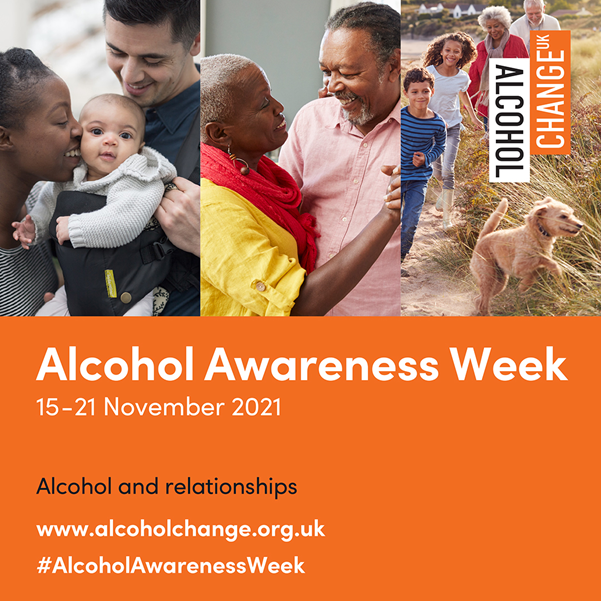Published: Wednesday, 17 November 2021 10:50

This years Alcohol Awareness Week is focused on the impact of alcohol upon our relationships. Relationships Scotland Orkney are raising awareness around this issue and are offering support for anyone in Orkney who has been personally affected by alcohol or their relationships have been affected by someone else's alcohol use.
Alcohol can be a social lubricant and can be a part of our relationships but it can also have a dysfunctional effect which can cause damage and strain to our relationships. This is outlined in the following video from Alcohol Change UK, watch this video to see how Dave’s drinking nearly caused his relationship with Emma to fall apart….but then he found he could change….
A problem shared is a problem halved. If you and your partner drink together, you could help each other to cut down. Making a joint plan to reduce your drinking can be easier than trying to make changes alone. Drinkaware have advice on how you can support yourself and your partner in reducing your drinking which can be found HERE.
Alcohol Change UK have a great fact sheet on alcohol and relationships which can be found HERE .
Are you worrying about a loved one’s drinking? This is stressful and it can be hard to know what to do. They may not think they have a problem. You may be supporting them on your own and have no one to talk to about it. You are not alone. Support is here for you. Relationships Scotland Orkney work with people who are concerned about someone else’s drinking or drug use, providing free advice, information and support tailored to your needs. You can visit the Alcohol Change UK website for information on supporting your family member or loved one, HERE. Scottish Families Affected by Alcohol and Drugs have a national Helpline for anyone concerned about a loved one’s substance use. Call 08080 101011 or visit www.sfad.org.uk
Keeping Track of your Drinking:
The Chief Medical Officers' guidance for both men and women is that: You are safest not to drink regularly more than 14 units per week, to keep health risks from drinking alcohol to a low level. If you do drink as much as 14 units per week, it is best to spread this evenly over 3 days or more.
You can find out more about the CMO's unit guidance on the Count14 Website: https://count14.scot
It’s easy to lose track of how much alcohol you’re drinking. Then you start to notice it’s affecting your relationships, your ability to work and your mental health. How much is too much? Alcohol Change UK have a informative factsheet about keeping track of your drinking HERE.
Alcohol and Young People:
“Evidence shows that young people who start drinking at an early age drink more, and more frequently, than those who delay their first alcoholic drink…” The average teen starts drinking at age 13. Alcohol can have serious effects on developing brains and bodies, as well as leaving teenagers vulnerable to unsafe situations and being taken advantage of. Young people who start drinking before age 15 are significantly more likely to develop alcohol use disorders as adults than those who wait until after age 18,
Researchers at the National Institute on Alcohol Abuse and Alcoholism (NIAAA) examined data from a three-year study of 22,316 drinkers who are now 18 years or older. They looked at the associations between the first incidence of alcohol dependence or abuse and three age-of-first-drink groups—younger than 15, between 15 and 17, and 18 years or older. The key finding of the NIAAA research was that people who started drinking before age 15 were 50% more likely to become alcohol dependent as adults. The same was true to a lesser extent for those who started drinking between ages 15 and 17.
The best way to talk to your teenager about alcohol is to sit them down and have an open, honest talk. If possible, try and talk to them before you suspect they’ve started drinking. As a defense teenagers can say it’s unfair that parents lecture them about drinking but drink alcohol themselves. You can agree that large amounts of alcohol are harmful to anyone, but also you can say that young people seem to be more vulnerable in some ways. If your child expresses frustration at you drinking while telling them not to, this could be time to start cutting down your drinking (get tips on how to cut down drinking alcohol at home).
Make sure your teenager knows they can come to you with any problems. Let them know alcohol abuse may be a symptom of how they’re feeling, and never a solution to a problem. There will be other ways of dealing with it. You can find advice, tools and videos from Drinkaware in their Family Lives & underage drinking support sections.
Parents and caregivers can play a crucial role in helping young people develop a healthy relationship with alcohol. It can be a difficult topic to raise with teenagers, but there’s lots of advice out there, a useful resource has been produced by Alcohol Change UK HERE:
If you’re worried about how your drinking affects your children, get information and tips HERE:
Relationships Scotland Orkney offer advice and support to parents and young people affected by their own or someone else’s drinking. They have a variety of options available for individuals and families. If you are worried about how alcohol is affecting you or someone you love then you can contact them by phone 01856 877750 or email This email address is being protected from spambots. You need JavaScript enabled to view it.
Throughout Alcohol Awareness Week you can check out the Relationships Scotland Orkney website further links and information
https://rsorkney.org.uk/2021/11/alcohol-awareness-week/